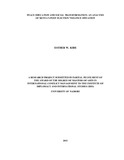| dc.description.abstract | Since war begins in the mind of men, it is in the minds of men the defences of peace must
be instructed. It is only when our minds are transformed we can move toward a culture of
peace. This research project, sets to investigate whether Peace Education in Kenya, has
been fully utilized to transform societies from a culture of violence to a culture of peace
given that Kenya is a post conflict society where aspects such as fear, hatred, and mistrust
exists after the 2007/2008 post election violence. The objectives of this study are to
examine the content of peace education in relation to the state of peace education in
Kenya and its transformative impact in Kenya since the post election violence. The
research questions that the research seeks to examine are, if the Kenyan education system
does promote a culture of peace through its curriculum and if peace education has
transformed the Kenyan society. This research is guided by the integrative theory of
peace that holds that peace is psychological, social, political, ethical and spiritual which is
an outcome of human cognitive, emotive and conative capacities that determine the
nature of our world views. This means that human beings can learn to be peacefully by
changing their world views to that of a culture of peace through peace education. In
addition, the United Nation supports that the ultimate tool for achieving a culture of peace
would be through peace education, where people are socialized to be peaceful and
envision peace in their mind. With an understanding that conflict will always be a part of
our society, we should therefore adopt norms that are geared towards cooperation, respect
of other people’s culture, respect of human rights and non- violence means of achieving
incompatible goals. To achieve the objectives and examine the research questions, the
research adopted a methodology that is descriptive which uses both primary and
secondary data by using books, interviews, questioners and focus group discussion hence
allowing use of both qualitative and quantitative research methods. The main finding of
the study from the collected data is that peace education in Kenya has not been effective
in addressing issues of equality, respect of cultural diversity and addressing fears to allow
Kenyans live anywhere without fear. This implies that peace education should be made
more effective in order to transform the Kenyan society in all aspects and nature a culture
of peace. Peace education should as well be made part of every learning institution to
impact knowledge and nature attitudes such as respect of human rights, peacefully ways
of conflict resolution, cooperation and patriotism. | en |

